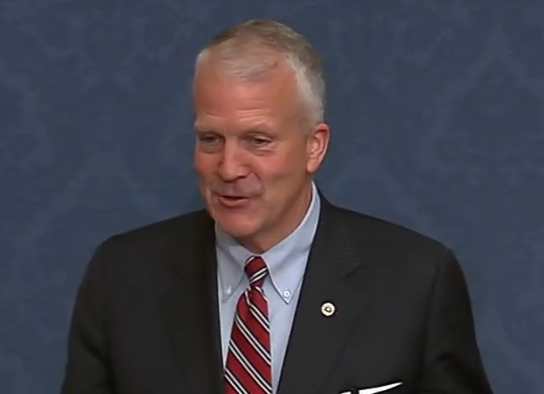Prioritizing Infrastructure, Security, Safety, and Local Input
WASHINGTON D.C.— U.S. Senator Lisa Murkowski (R-AK) yesterday introduced bipartisan legislation aimed to increase the nation’s presence in the Arctic by supporting responsible research and development in the U.S. Arctic while giving those who live in the region a greater voice on policy and research.
The Shipping and Environmental Arctic Leadership Act (SEAL Act), cosponsored by Senators Angus King (I-ME) and Dan Sullivan (R-AK), addresses increasing shipping and maritime traffic by establishing a congressionally charted seaway development corporation in the Arctic. Specifically, the bill establishes a corporation that will develop a voluntary tariff model—consistent with customary international law– to help fund the infrastructural and environmental demands of safe and reliable shipping in the Arctic Region.
The Arctic Policy Act (APA), cosponsored by Senators Brian Schatz (D-HI) and Dan Sullivan (R-AK), takes steps to increase local and indigenous voices in federal science and policy in the Arctic. The APA aims to improve coordination and collaboration across agencies to advance an integrated plan for the Arctic, including establishing an Advisory Committee with local and tribal input in shaping national Arctic priorities.
“Our new reality in the Arctic is that we are seeing greater opportunities but also greater challenges, such as environmental changes opening sea routes year-round and an increased global interest in the area. These bills will both play a significant role in further developing a plan to address U.S. priorities in the Arctic, while incorporating the input of indigenous Alaskans who live there. This legislation will also encourage those who use our Arctic waterways to contribute to developing infrastructures such as ports and maritime shipping services, in order to ensure the safety and management of the region,” said Senator Lisa Murkowski. “The Arctic is a national asset and should be treated as a national priority. I’m proud to lead legislation that will help us capitalize on opportunities that are critical to our Arctic strategy, allowing us to truly claim America’s leadership role in this region of global importance. I look forward to continuing conversations with Arctic residents and my colleagues in Washington to move these proposals forward.”
[content id=”79272″]
“The retreat of Arctic sea ice, improvements in icebreaking technology, and global demand for resources have led to an increase in human activity in the Arctic while also raising concerns about the future of the region. The SEAL Act will provide the coordination among federal, state, international, and local stakeholders necessary to support the needs of Arctic transportation in the years ahead,” said Senator Sullivan. “With increased attention and shipping traffic in the Arctic, it’s important that the people who live in the region have a seat at the table when it comes to developing policy,” said Senator Sullivan. “The Arctic Policy Act will create advisory groups that ensure local stakeholders and Alaska Native people are involved in charting the course for the future of the Arctic.”
“This bill will empower native communities to play a leadership role in charting a way forward in the changing Artic region,” said Senator Schatz. “I’m proud to be working with Senator Murkowski to make sure the United States expands our role in this region in a responsible, strategic way.”
“As the world’s climate warms, so too does the landscape of the Arctic,” said Senator King. “With melting ice comes increased access to shipping lanes, and we need to be proactive to understand how to safely access economic opportunity while also protecting the unique ecology of the high North and the interests of the Arctic people. Establishing a congressionally charted seaway development corporation would take an important step to strengthen American leadership in the Arctic, explore the prospects of the region, and responsibly understand and mitigate the impacts of climate change.”
Shipping and Environmental Arctic Leadership Act Highlights:
Click here for full text of the bill.
Click here for a one-pager on the bill.
- Collaboration: Establishes a congressionally chartered seaway development corporation in the Arctic. This Arctic-focused Corporation will work with representatives from NOAA, the State Department, the Coast Guard, and DOT—as well as representatives from the State of Alaska, the Alaskan business community, Alaskan coastal and subsistence communities and the Alaskan maritime labor organizations—to develop an Arctic shipping union whose leadership will advocate for safe, secure, and reliable Arctic seaway development, and further ensure that the Arctic becomes a place of international cooperation rather than competition or conflict.
- Fee-Based System: Tasks the new seaway development corporation to establish a system in the Arctic that will collect voluntary maritime shipping fees. The funds will be used to help cover necessary costs to build out Arctic infrastructures, such as ports and maritime shipping services, in order to ensure the safety and management of the region.
- Ties with Arctic Residents: Requires the Corporation to work in partnership with Arctic residents and Arctic shippers to build an appropriate system that will support shipping in the Arctic, in such a way that will protect the environment and biodiversity of the ocean Alaskans depend on for food.
Arctic Policy Act Highlights:
Click here for full text of the bill.
Click here for a one-pager on the bill.
- Coordination: Permanently establishes the Arctic Executive Steering Committee within the Department of Homeland Security to provide the coordination necessary across agencies to advance an integrated plan for the Arctic.
- Collaboration: Establishes an Arctic Advisory Committee to ensure that residents of the Arctic and Alaska Native people have a seat at the table for the development of policy. Additionally, the legislation calls for the establishment of Regional Tribal Advisory Groups, starting with the Bering Sea Regional Tribal Advisory Group, to advise the federal government as it shapes national priorities in the region. These tribal advisory groups will be empowered to provide advice on specific challenges or regionally-important issues.
- Indigenous Representation: Updates the Arctic Research and Policy Act of 1984 to add two additional indigenous representatives on the Arctic Research Commission, thereby providing greater opportunities to include traditional knowledge and community coordination in our nation’s scientific efforts in the Arctic, including efforts to study and understand climate change.
Senator Murkowski is considered the leading expert among her Congressional colleagues on Arctic issues and has worked continuously to raise awareness of the Arctic. At the beginning of the 114th Congress, Senator Murkowski and Senator Angus King (I-ME) formed the Senate Arctic Caucus, to advance issues important to the Arctic and to the people who live there. Murkowski is the U.S. Representative to the Standing Committee of Parliamentarians of the Arctic Region. Murkowski has also led the charge to recapitalize and expand America’s fleet of Polar Security Cutters (aka icebreakers).








